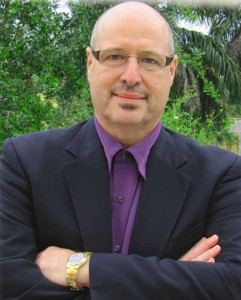
Miami New Music Festival “marches on”
For almost 20 years now, Miami has been home to an annual festival of new classical composition and performance.
What began in 1993 as the May in Miami Music Festival became the Miami New Music Festival not long after that, and last month it got under way with an organ recital by New York-based Will Smith, who teamed with Orlando artist Nathan Selikoff for a concert of pieces with video projections.
Tonight marks the second installment of the festival, which concludes in late April, and features a wide variety of concerts and guests. The festival was founded by composer Orlando Jacinto Garcia, a Cuban-born musician who leads the school of music at Florida International University and who freely admits that sometimes he’d rather be doing something else.
“I really enjoy it, but it does take a lot of work,” Garcia said. “I’d rather spend my time writing music.”
But Garcia is willing to put away the manuscript paper temporarily each year to get the show going, because he believes that Miami needs an arts scene that features new classical composition.
“Outside of sporadic things that happen here and there, there really isn’t much,” he said. “So I’ve kind of been marching on, continuing to do this. Because I feel there’s a real need in the community for people to have this experience and to hear what composers and performers are trying to do today, especially the ones who are trying to do things that are a little bit different.”
One of the outgrowths of the festival has been the establishment of Nodus, which is FIU’s contemporary chamber music ensemble. The group, which features many well-known South Florida musicians, has itself done many non-festival performances across the region.
In South Florida, “there is no Continuum, Alarm Will Sound, Speculum Musicae — you name it, all those groups in New York, dozens of them, that do new music,” Garcia said. “Kind of out of necessity, I created the festival, and the ensemble grew of the festival.”
Tonight, the festival welcomes another Cuban-born musician, Tania Leon, who has established a good career for herself as a composer and conductor. Garcia said the festival performers, who include the Nodus ensemble, will present three of Leon’s pieces: “To and Fro,” a song cycle; “Momentum,” a “really dynamic piece” for solo piano; and “Acana,” an orchestral work that will be played by the FIU Symphony.
Also on the program will be a piece by composer Jeff Herriot, an FIU alum now teaching at the University of Wisconsin-Whitewater, and Garcia’s own “Madera Sonora,” for solo marimba. The concert begins at 7:30 tonight at FIU’s Wertheim Performing Arts Center.
The other concerts, briefly:
March 9, Centro Cultural Espanol (7:30 p.m.): Each year, in collaboration with the Spanish Cultural Center on Biscayne Boulevard, the festival features the music of a Spanish composer. This year, it’s Sebastián Mariné. “He’s a fantastic Madrid-based composer. We’ll be hearing his music as well as music by some South Florida composers,” Garcia said. Among them are Frederick Kaufman, Jacob Sudol, Paula Matthusen and Garcia, who will be represented by “Universo Paralelo No. 1.”
March 22, Miami Beach Botanical Gardens (7:30 p.m.): Clarinetist Esther Lamneck, who teaches at New York University, is the guest for this concert. “She’s doing a very varied repertoire, everything from young composers to more established composers,” Garcia said. That includes a work for clarinet and electronics by Robert Rowe and a work for FLEA, FIU’s laptop ensemble, written by Sudol, David Dunn and Gustavo Matamoros, and which will include improvisations by Lamneck.
March 31, Miami Beach Urban Studios (7:30 p.m.): This concert is a first for the festival: a program of music by FIU composition alumni. “I’ve been running the composition program here since the early ‘90s, and we’ve graduated a lot of really talented students who’ve gone on to do a lot of great things,” Garcia said. In this new gallery space, pieces by Paulo Chin, Adalberto Yanes, Jorge Grossman, John Parcell, David Mendoza and Daniel Manoiu are scheduled.
April 4, Frost Art Museum (7:30 p.m.): This program will feature works with video. “We project on the wall of the Frost Museum at sundown,” Garcia said. Local and national videomakers will be represented, and before the videos begin, the FIU New Music Ensemble will give a performance of “Cobra,” a piece whose sound is determined by game pieces, organized by the eminent avant-gardist John Zorn.
April 21, Miami Beach Urban Studios (7:30 p.m.): FIU’s ensemble-in-residence, the Amernet String Quartet, is featured on the final concert of the series along with the Nodus ensemble. The Nodus group will play two chamber works from an International Society for Contemporary Music call for scores (FIU’s music school is an ISCM chapter). The Amernet will tackle a string quartet by Dmitri Tymoczko, a professor at Princeton.
The festival has gone its steady way as the area has grown substantially not only in sheer size but cultural accoutrements, Garcia said. And he’s also noticed that the winter residents, who used to tout their cultural allegiance back to their home cities in the Northeast, are now much more likely to support local events.
“To me, that’s a very significant change, because that tells me that the cultural events that are taking place are of pretty high caliber,” he said. “I think we’re over the hump, and we’re picking up speed and moving in a very positive direction.”
For ticket and other information about the New Music Festival, visit www.newmusicmiami.org.
Recent Content
-
Artsarticle ·
-
Artsarticle ·
-
Artsarticle ·

